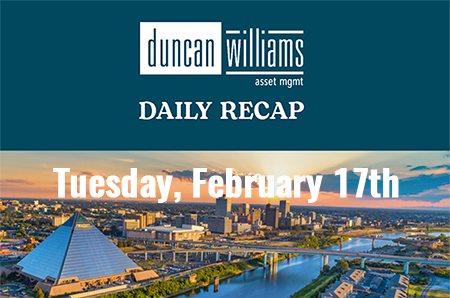How Duncan Williams Asset Mgmt added $100M in cash management accounts in five months

Memphis Business Journal
Jun 9, 2023, 1:35pm CDT
David Scully, president of Duncan Williams Asset Management
As 2022 came to a close and the leaders of Duncan Williams Asset Management (DWAM) looked to the new year, they set an internal goal for their cash management strategy. They wanted to add $100 million in assets through it in 2023, believing the offering would resonate with people in the current economic environment.
It seems that confidence has been justified because DWAM reached the $100 million mark just five months into the year. And now, the investment advisory firm is upping the ante — it wants to bring in $250 million through it this year.
“In the current environment — and the environment that we expect through the end of this year and probably halfway into next year — this is going to be a real driver of assets for us,” said David Scully, DWAM’s president.
The recent success of the cash management offering provides a boost to a growing firm that already had momentum. At the end of 2021, DWAM had about $747 million in total assets under advisement. Today, that number is around $1.2 billion.
Here’s a breakdown of why DWAM’s cash management strategy has done so well in 2023, and who’s been drawn to it.
‘Money that we cannot lose’
Here’s a brief explanation of what cash management is: Essentially, it’s a lower-risk form of investing for people and organizations that have a set of funds and don’t want it to possibly decrease in size. As Scully noted, their tolerance for risk is "zero," and a cash management strategy allows them to make as much of a yield as they can without taking any chances.
“Cash management is almost always, ‘We have a pool of money that we cannot lose,'” he explained. “The first priority is capital preservation. The second priority is also capital preservation. The third priority is, ‘If we can make a little money, we’d like to.’”
Let’s say, just as an example, that there’s a man with plans to buy a lake house, and six months from now, he’ll have to make a $200,000 down payment. Though he has the money, he needs a place to store it for half a year, without the risk of it dwindling on the stock market. But at the same time, he’d still like to gain a yield if he can.
“We can take your $200,000 over the next six months and [look to] turn it into $211,000,” Scully said. “You [potentially] get $11,000 just by doing this versus if you just stuffed it under your mattress, it's $200,000.”
At a time when there’s economic uncertainty, and some have speculated a recession could be looming, this type of strategy can be particularly alluring.
“Every now and then we’ll have folks who reach out and say, ‘Hey, I’ve been invested, but I’m nervous about the markets,’” Scully said. “They work to shift their own strategies to include more cash because it’s safer.”
‘A big piece of the conversation’
Economic uncertainty, however, isn’t a factor DWAM is relying on to draw people to its cash management strategy. Its team is intent on playing the long game, and not leaning into cash management only when there are worries on Wall Street.
Scully also believes there are other factors drawing people to cash management. Rising interest rates and improving yields have been key drivers, which have helped DWAM differentiate its cash management offering from others.
“We had this really steep spike in interest rates over the course of about a year,” Scully said. “That made cash management more interesting to folks.”
Before, cash management yields were often fairly low. And even if DWAM staffers felt their service could make their clients more money than other firms, the difference wasn’t necessarily enough to be a draw.
“Maximizing yield looked like 18 basis points. It just wasn't that big of a deal,” Scully said. “Your million-dollar account earned $1,800. And you say, ‘Hold on, we’ve got a better way across the street. We’re at 30 basis points.’ It’s like, ‘Well, OK, now our million-dollar account earns $3,000 instead of $1,800.'”
This often wouldn’t be enough for an organization or person to go through the trouble of opening a new account. For some, it’s a small difference. But these days, interest rates have significantly increased — and that’s helped lead to higher yields, which have in turn helped distinguish DWAM’s cash management offering.
That $1,800 versus $3,000 conversation can become a $35,000 versus $55,000 conversation.
“At that point, $20,000 [equals], ‘We’ll file paperwork for that. We weren’t doing it for $1,200, but we’ll do it for $20,000,’” Scully said. “So, the spike in interest rates is really a big piece of the conversation. … There's more of an incentive for them… to have more intentionality about the way they invest their cash.”
All of this, of course, begs the question — how is DWAM potentially scoring higher yields than some of its counterparts?
The strategy
DWAM’s financial custodians — the ones actually holding their clients’ funds — are Schwab and Fidelity, and each provide the local firm with access to massive inventories of certificates of deposit (CDs) being issued by a variety of banks.
DWAM’s advisors, on behalf of their clients, can go through these inventories and find and purchase CDs — and sometimes treasuries and agencies — with the highest possible yields. Each is bought for just under $250,000, ensuring full coverage from the Federal Deposit Insurance Corp.(FDIC). And a client’s CDs are then placed in one account with Schwab or Fidelity.
For instance, DWAM might buy 16 CDs from 16 different banks, then have them all placed in one account for their client. And this strategy seems to be effective.
“We're finding that we've got really high yields compared to what other options people might have,” Scully said.
If needed, DWAM’s clients can also have their CDs sold sooner than they initially planned, without fear of financial penalties. Typically, CDs have maturity dates. You’re committed to retaining them for a certain amount of time and selling one before that date could come with a penalty or fee, depending on the institution you bought it from. But with DWAM’s strategy, this isn’t the case.
Because while in other instances you might be prematurely returning the CD to the bank that issued it, DWAM will sell it to someone else on the secondary market if needed.
“Whomever’s going to buy it, just buys it for a fair price and then you get that money,” Scully said. “And that’s all there is to it.”
The clientele
So, who’s been drawn to DWAM’s cash management strategy?
There’s no single answer to that question.
Many of the clients that have cash management accounts are nonprofits. Some of them might have raised money for capital projects, but haven’t begun construction and want a place where they can safely store the funds while maximizing yields.
Other clients have been high-performing companies.
“The [companies] that have got a high-level cash flow, and they’re cash rich, but they’re not really sure what to do with it, they’ve been good candidates for this too,” Scully said.
Then there are individuals. Perhaps they’re content with their financial position and not interested in taking any kind of risk. Or perhaps they have funding for a side project, but need a place to keep the money until it’s time to spend it.
That’s not to say DWAM expects its cash management strategy to be predominantly used to store project funds, even though there can be instances of this.
“We don't expect the cash management business that we've built to be something that's fleeting and has to be replenished often,” Scully said.
For example, DWAM has four organizations that have each put over $10 million into cash management accounts — and the expectation is that the money is in those accounts “for the long term.”
“A lot of it,” Sully explained, “is just, 'We have an operating reserve. It's our rainy-day fund. It needs to be liquid, it needs to be safe, and we want to maximize yield.'"
John Klyce
Reporter - Memphis Business Journal












